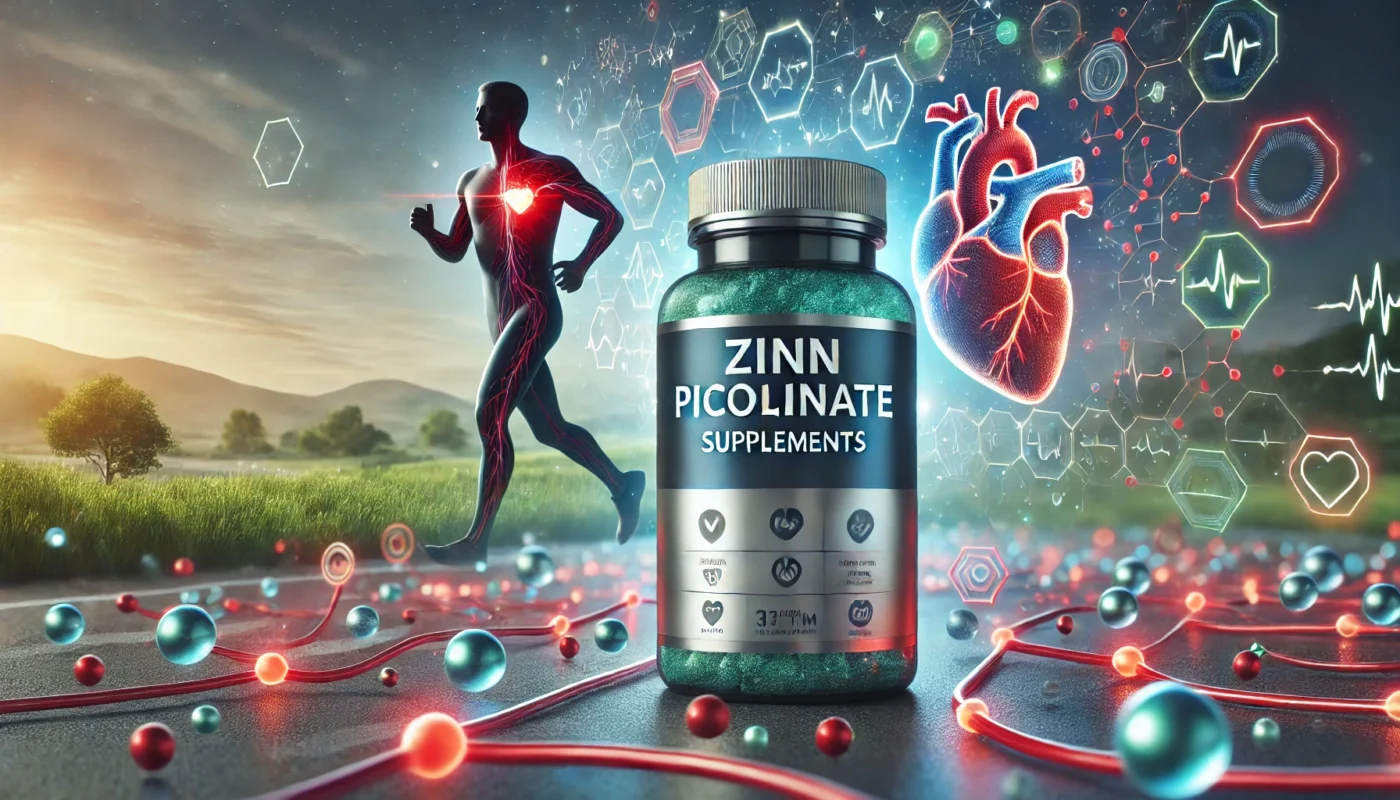Modern lifestyles, marked by busy schedules, dietary insufficiencies, and environmental stressors, demand a proactive approach to maintaining health and vitality. Nutritional supplementation has become a cornerstone of wellness strategies, and among the array of options available, zinc picolinate stands out as a potent, highly bioavailable form of zinc that supports a wide range of physiological functions.
Zinc is an essential trace mineral involved in over 300 enzymatic reactions in the body, influencing everything from immune function and wound healing to DNA synthesis and cellular repair. Zinc picolinate, a chelated form of zinc, offers superior absorption and effectiveness, making it an ideal candidate for daily supplementation. This article explores the importance of zinc picolinate, its key health benefits, and why it deserves a place in your daily wellness routine.
You May Also Like:
Zinc Picolinate and Seasonal Immunity: Staying Healthy Year-Round
Zinc Picolinate for Healthy Aging in the Immune System: What You Need to Know
Zinc Picolinate as a Daily Supplement: Essential for Modern Wellness is an original (HSLHealing) article.
What Is Zinc Picolinate?
Zinc picolinate is a chelated form of zinc, in which zinc is bound to picolinic acid. This structure enhances zinc’s solubility and absorption in the gastrointestinal tract, ensuring that more of the mineral is delivered to tissues where it is needed. It is particularly effective for individuals who struggle with zinc absorption or have increased zinc requirements.
Compared to other forms of zinc, such as zinc sulfate or zinc oxide, zinc picolinate has been shown to provide superior bioavailability, making it a preferred choice for supplementation.
Why Zinc Is Essential for Modern Health
Zinc is a fundamental nutrient required for numerous biological processes that are vital for maintaining overall health. Some of its key roles include:
- Immune System Support:
Zinc boosts the activity of immune cells such as T-cells and natural killer (NK) cells, which help the body fight infections and illnesses. - Cellular Repair and Growth:
Zinc is involved in DNA synthesis and cell division, making it essential for growth, development, and wound healing. - Metabolism and Energy Production:
Zinc supports enzymatic reactions that regulate metabolism and energy production, ensuring that the body functions efficiently. - Hormonal Balance:
Zinc influences the production of hormones such as insulin, testosterone, and thyroid hormones, which are critical for maintaining metabolic and reproductive health. - Antioxidant Defense:
Zinc acts as a cofactor for superoxide dismutase (SOD), an antioxidant enzyme that neutralizes free radicals and reduces oxidative stress.

Key Benefits of Zinc Picolinate as a Daily Supplement
1. Enhancing Immune Function
Daily supplementation with zinc picolinate can bolster the immune system, making it more resilient against infections such as colds, flu, and other respiratory illnesses.
- Study Insight: A clinical trial published in The American Journal of Clinical Nutrition found that zinc supplementation reduced the duration and severity of the common cold by 33%.
2. Supporting Skin Health
Zinc picolinate promotes healthy skin by regulating oil production, reducing inflammation, and accelerating wound healing. It is particularly beneficial for individuals with acne, eczema, or rosacea.
- Research Finding: A study in Dermatologic Therapy showed that zinc supplementation reduced acne severity in 54% of participants within 12 weeks.
3. Improving Cognitive Function
Zinc is vital for brain health, influencing neurotransmitter activity, memory formation, and cognitive performance. It also helps protect neurons from oxidative stress.
- Clinical Evidence: A study in Frontiers in Aging Neuroscience reported that zinc supplementation improved memory and attention in older adults with mild cognitive impairment.
4. Promoting Reproductive Health
Zinc picolinate supports reproductive health in both men and women. It enhances sperm quality and testosterone levels in men and supports ovulation and hormonal balance in women.
- Study Insight: Research in Fertility and Sterility found that zinc supplementation increased sperm motility and concentration in men with subfertility.
5. Strengthening Bone and Joint Health
Zinc is essential for bone mineralization and cartilage repair, making it beneficial for maintaining skeletal integrity and reducing the risk of osteoporosis.
- Evidence: A study published in Journal of Trace Elements in Medicine and Biology found that zinc supplementation improved bone density in postmenopausal women.
6. Supporting Gut Health
Zinc picolinate strengthens the intestinal lining, reducing the risk of conditions like leaky gut syndrome and inflammatory bowel disease (IBD).
- Research Finding: A study in Gut Microbes showed that zinc supplementation improved gut barrier function and reduced intestinal inflammation in patients with IBD.

Who Can Benefit from Zinc Picolinate?
While zinc picolinate is beneficial for everyone, certain groups may find it particularly helpful:
- Individuals with Nutritional Deficiencies:
People with limited access to zinc-rich foods or those following restrictive diets (e.g., vegans and vegetarians) are at higher risk of deficiency. - Older Adults:
Aging reduces zinc absorption and increases the risk of deficiency, making supplementation essential for maintaining health. - Athletes:
Intense physical activity depletes zinc stores, and supplementation can support recovery, energy production, and immune function. - Individuals with Chronic Illnesses:
Zinc supplementation can improve outcomes in conditions such as diabetes, inflammatory diseases, and autoimmune disorders. - Pregnant and Lactating Women:
Zinc is critical for fetal development and lactation, making supplementation vital during pregnancy and breastfeeding.
Zinc Deficiency: A Global Concern
Zinc deficiency affects nearly 20% of the global population, with significant consequences for health and well-being. Common symptoms of zinc deficiency include:
- Frequent infections
- Delayed wound healing
- Hair loss
- Skin conditions such as acne or eczema
- Impaired cognitive function
Statistics:
- The World Health Organization (WHO) estimates that zinc deficiency contributes to approximately 16% of lower respiratory infections and 10% of diarrheal diseases globally.
- A study in Clinical Nutrition found that 68% of individuals with chronic illnesses were zinc-deficient, underscoring the importance of supplementation.
Dietary Sources of Zinc
While zinc picolinate is an effective supplement, it’s also important to include zinc-rich foods in your diet:
- Animal-Based Sources: Oysters (highest source), beef, chicken, turkey, and eggs.
- Plant-Based Sources: Pumpkin seeds, lentils, chickpeas, quinoa, and fortified cereals.
However, absorption from plant-based sources can be limited due to the presence of phytates, which bind zinc and reduce its bioavailability. This makes zinc picolinate a valuable addition for individuals relying on plant-based diets.
Recommended Dosage and Safety
The recommended dietary allowance (RDA) for zinc is:
- Adult men: 11 mg/day
- Adult women: 8 mg/day
For therapeutic purposes or addressing deficiencies, doses of zinc picolinate typically range from 15–30 mg/day. Excessive zinc intake (above 40 mg/day) can cause:
- Nausea and gastrointestinal discomfort
- Interference with copper absorption
Note: Always consult a healthcare provider before starting supplementation to determine the appropriate dosage and ensure safety.

How to Incorporate Zinc Picolinate into Your Routine
- Take with Meals: Zinc is best absorbed when taken with food, particularly meals containing protein.
- Combine with Synergistic Nutrients: Pair zinc picolinate with vitamin C, magnesium, or selenium for enhanced benefits.
- Monitor Progress: Track improvements in energy, immunity, and overall well-being to assess the effectiveness of supplementation.
Future Research Directions
While the benefits of zinc picolinate are well-documented, future studies could explore:
- Its long-term effects on chronic disease prevention.
- Synergistic interactions with other nutrients in optimizing health.
- Its role in emerging areas of health, such as gut-brain connection and personalized nutrition.
Conclusion: Zinc Picolinate for Modern Wellness
Zinc picolinate offers a powerful, science-backed solution for addressing modern health challenges and enhancing overall vitality. By supporting immune function, skin health, cognitive performance, and reproductive health, zinc picolinate provides comprehensive benefits that make it a valuable addition to daily wellness routines.
For individuals seeking to optimize their health and resilience, incorporating zinc picolinate into a balanced diet and supplement plan can provide significant benefits. As always, consult with a healthcare provider to tailor supplementation to your specific needs and ensure safe and effective use.

References
- Zinc in Cognitive Impairment and Aging. Retrieved from: https://pmc.ncbi.nlm.nih.gov/articles/PMC9312494/
- The Role of Zinc in Male Fertility. Retrieved from: https://pmc.ncbi.nlm.nih.gov/articles/PMC7589359/
- Zinc supplementation improves bone density in patients with thalassemia: a double-blind, randomized, placebo-controlled trial. Retrieved from: https://pmc.ncbi.nlm.nih.gov/articles/PMC3778866/
- Zinc Therapy in Dermatology: A Review. Retrieved from: https://pmc.ncbi.nlm.nih.gov/articles/PMC4120804/
- Zinc as a Gatekeeper of Immune Function. Retrieved from: https://pmc.ncbi.nlm.nih.gov/articles/PMC5748737/
Important Note: The information contained in this article is for general informational purposes only, and should not be construed as health or medical advice, nor is it intended to diagnose, prevent, treat, or cure any disease or health condition. Before embarking on any diet, fitness regimen, or program of nutritional supplementation, it is advisable to consult your healthcare professional in order to determine its safety and probable efficacy in terms of your individual state of health.
Regarding Nutritional Supplements Or Other Non-Prescription Health Products: If any nutritional supplements or other non-prescription health products are mentioned in the foregoing article, any claims or statements made about them have not been evaluated by the U.S. Food and Drug Administration, and such nutritional supplements or other health products are not intended to diagnose, treat, cure, or prevent any disease.

